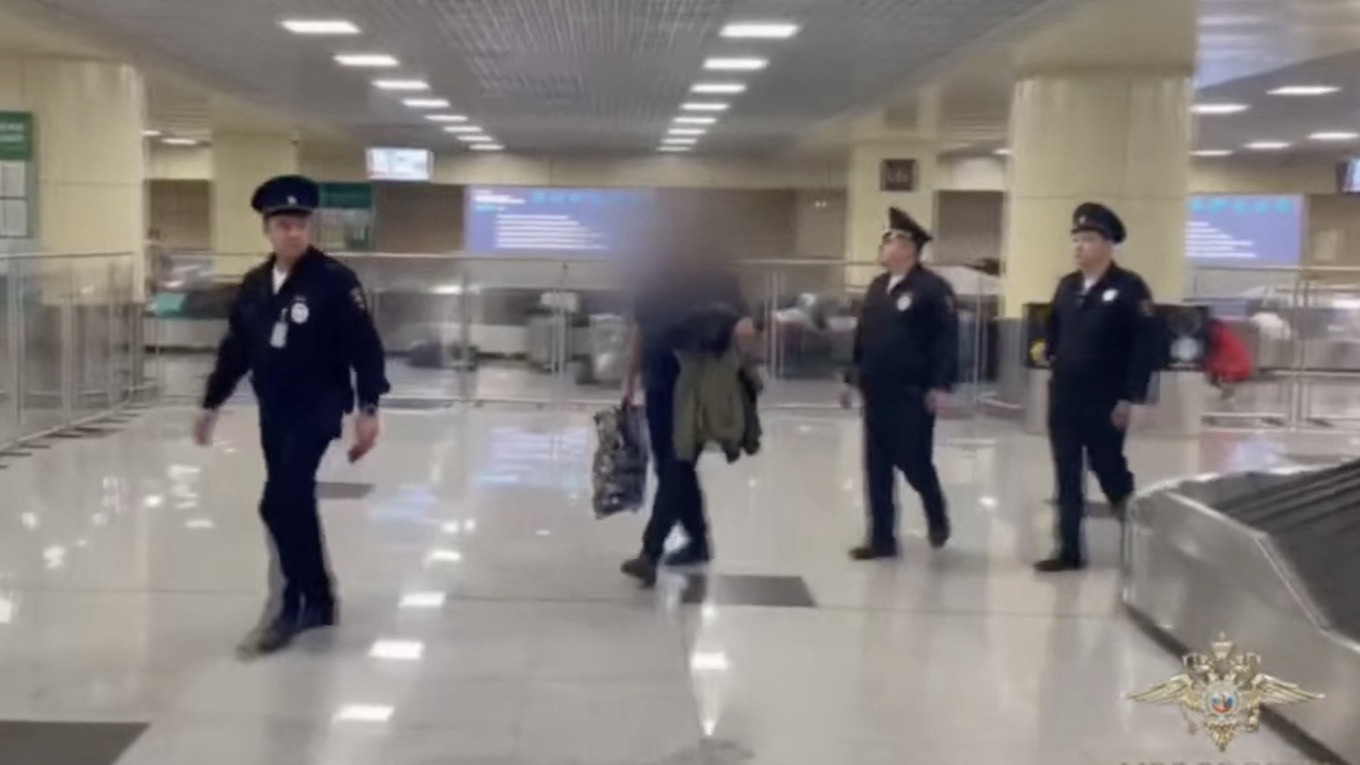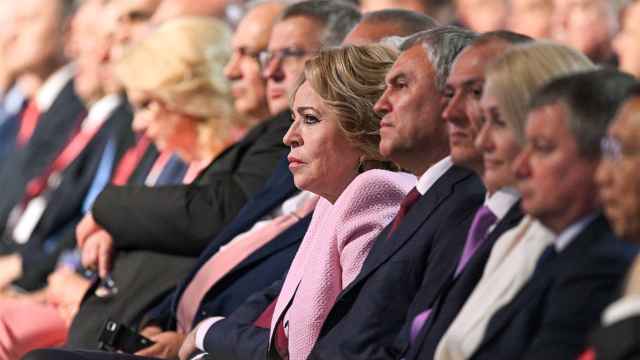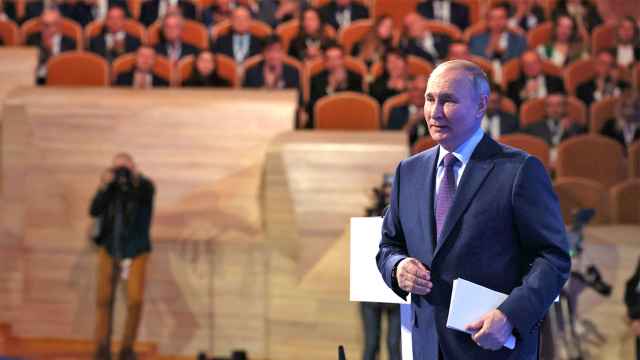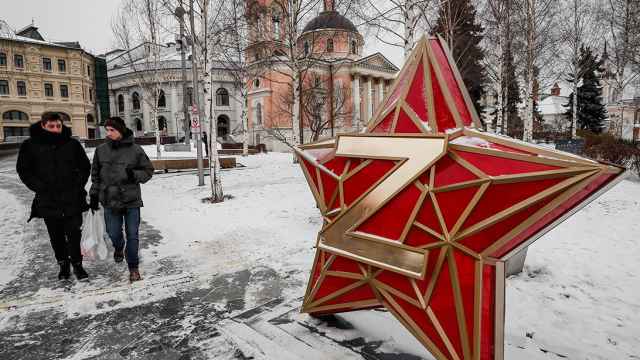One of the landmark events of the past year was the return to Russia and the immediate arrest at the airport of Denis Gribov, the former federal deputy minister of education. Why would an elitist who had left for safe countries go home to Russia, where a corruption purge is clearly unfolding and where he is clearly facing prison?
The Gribov case has caused cognitive dissonance among analysts and observers: why did at least some of the recently arrested high-ranking representatives of the Defense Ministry and regional leaders not flee to the West, even though in most cases these wealthy people knew that a decision had been made to arrest them. Many of them had spent critical time before their arrest trying to negotiate. Maybe they thought their patrons would be able to defend them.
Why are Russian diplomats, intelligence officers and scientists (who are increasingly under FSB pressure) not fleeing to the West? Between 1953 and 1990, over 1,200 Soviet elites chose to emigrate (or escape) to Western countries — a figure that does not include the Refusenik movement and the mass emigration of Jews. Why does nobody try anymore?
Do they all love Russia so much that they are willing to live and work until the moment when they come to be arrested? Or do they hope that they will be bypassed by purges?
The elites in the U.S.S.R. were never monolithic. The emigration of prominent members of the Soviet elites to the West is divided into two clear periods — emigration from Stalin's regime, was often due to the threat of repression or assassination), while people left after his death in pursuit of freedom and life in the West.
The most significant holes in the Soviet ideological boat after Stalin's death were the famous KGB assassin Bogdan Stashinsky, dancers Rudolf Nureyev and Mikhail Baryshnikov, and Stalin's daughter Svetlana Alliluyeva, UN Deputy Secretary-General Arkady Shevchenko, grandmasters Viktor Korchnoi and Lev Alburt, diplomats and intelligence officers Oleg Gordievsky, Stanislav Levchenko, Yuri Bezmenov, scientists Mikhail Voslensky, Stanislav Kurilov — but hundreds of others also escaped. A rich cross-section of intellectuals, high-ranking diplomats and intelligence officers, representatives of the creative and scientific elite, for whom the main motivation for emigration was the impossibility of living in the U.S.S.R., the impossibility of creative and scientific growth, and sometimes even physical threats to life.
After the collapse of the U.S.S.R., emigration rose so high that it was difficult to identify significant representatives within it. The choice of a new country with the opportunity to return home safely, guaranteed by the Constitution of 1993, was driven by economic reasons and professional ambitions. At the same time, a counterflow also took shape: hundreds, if not thousands of Russian emigre businessmen and intellectuals, as well as those with Russian roots, returned to Russia.
If we consider the annexation of Crimea and the occupation of Ukrainian territories to be a moral rubicon, we find that very few members of Russia’s ruling elite left. Those who did mostly left for business reasons, not out of disgust with their government. Some creatives and businessmen have left Russia and integrated into other countries with varying degrees of success., writers Boris Akunin, Dmitry Bykov, and Dmitry Glukhovsky, economist and administrator Sergei Guriev, financier Lev Khasis, scientist and administrator Vladimir Mau, and Anatoly Chubais are notable names. And only Chubais out of the entire list of those who left represents for Russian and Western elites a kind of “consolidation point” of joint efforts of the Russian and Western ruling classes. With the exception of high-ranking diplomat Boris Bondarev, Oleg Smolenkov (who had to escape as he was a CIA agent) and Yuri Khokhlov, very few diplomats and high-ranking officials have left
The invasion of Ukraine by Russian troops in February 2022 did not become a watershed. Representatives of the political elite rarely leave the Russian Federation at all. The story of a pillar of Putin's regime, the late Mikhail Lesin, a former minister and prominent dignitary who created the media management system in the Russian Federation, is of a different nature. His departure to the United States looks more like an attempt to infiltrate the American political elite in order to corrupt it than a frontier emigration.
In general, the Russian Federation has not suffered any significant losses over the past 20 years. Business continues to profit from war and the blood of its own people and others, while the managerial elites have proved to be much more consolidated than even in Soviet times.
Today it is believed that elites remain generally loyal to the regime, which drags them further and further into international crimes like a mafia as they continue to work and make money mainly on connections. However, rather than an active consensus, this cohesion is the product of several factors that prevent elites from breaking from the ranks of the criminals running Russia.
The phenomenon of crabs in a bucket is well documented. When one crab tries to clamber out of the container, the others drag it back in. You can see the same behavior in humans when people try to prevent others from ascending the social ladder.
This is not uncommon in cultures ranging from Britain and America, to Japan and India. But the peculiarities of the Russian mindset make things work differently. If the crabs were patriotic-minded Russians, they would drag their colleague trying to break free more out of a collective fear of the unknown, rather than out of a desire to push the upstart back in.
According to Russian historian Dmitry Shusharin's book Russian Totalitarianism. Freedom Here and Now, Russia’s privileged liberals “realize the duality of their position”: the media and financial sectors they work in have the potential to destroy the regime, but are inseparable from how the regime exercises its power. Furthermore, they depend on the same system that oppresses them and have forgotten what it is like to live without it. Even though they are opposed to the regime, they are still affected by its rhetoric.
Of course, this paradigm does not apply only to liberals. It is characteristic of the entire ruling elite.
Russian elites also display a sense that they are untouchable and are ready to do anything to avoid losing their status in the system and are ready to go to prison next to other elites. Their attempts to preserve status even through the threat of arrest and prison may indicate a social phenomenon of an unprecedented scale.
Here we have to describe the motivations of the Russian elites in terms of the mixing of needs in Abraham Maslow’s hierarchy of needs. For example, Nazi propaganda caused a seemingly small change in the value system in the1930s. Fascism forced Germans to put the value of national identity in the form of racial theory before other civilizational values. It took about 20 years of denazification in Germany for the Germans' hierarchy of values to take a civilized form. Similarly, Kremlin propaganda and the soaring incomes that come from being complicit in Moscow’s criminality make Russians value in-group respent above their security.
This incredible value-somersault and its consequences are yet to be studied by scholars, and for now, it is difficult to predict where it will lead Russia. Perhaps the national madness will go much further than where it went in Nazi Germany and the consequences of such value shifts for the world are unpredictable since the Kremlin has threatened to unleash nuclear destruction
This feeling of belonging to the circle of the untouchables and permissiveness is also inherent in some liberals, as shown by Leonud Gozman’s wife being placed under house arrest after trying to take “culturally sensitive” crockery out of Russia when she visited in late 2024. Thus, the inability of the Russian elite to stay in the West is probably related to the fear of losing status and their inability to integrate into elite circles abroad.
This inability is a direct consequence of the fact that many Russians have not acquired easily convertible and in-demand skills in other countries. This is especially noticeable among the managerial elite, which has become accustomed to a highly distorted way of exercising power and management. The presence of big money abroad is not the anchor that can hold these elites, because the type of mentality that was selected during their career development does not save them from the loss of status and the privileges that (together with money) power gives.
Another explanation may be the position of the closest family members who do not want to lose their social status even if their loved ones are targeted. This paradoxically intersects with “grassroots” commercial patriotism, which forces mothers and wives to send their husbands and sons to war for the sake of buying a white Lada or paying the mortgage, which Vladislav Inozemtsev called “deathonomics.”
How did Russia come to ossify its international image and deny any accepted civilizational norms that it seemed to have learned over the past 30 years? After a long period of hard and servile obedience to those values that made Russia’s economy one of the largest in the world, it suddenly turned out that the Russian elites did not need any of it and could continue behave like it was the Soviet days without consequences
Moreover, the blatant rhetoric of the Russian elite at the international level has long outstripped the protocol form adopted during the late Soviet era. Therefore, it seems to us that the elites are inseparable from today's Russia, and it is not Putin who created them, but they created Putin as we know him.
It is very unlikely we will see a split among Russia’s elites, as they have formed and cemented themselves in a monolithic and logical manner. Moreover, the West does not create opportunities for them to leave Russia and separate from the essentially criminal groups that are called the modern Russian government, except in extreme scenarios like death threats. But the Kremlin is boiling their elites over a slow fire and it is hard to jump out of that cauldron.
Moreover, in some cases, the West and the Kremlin act as if they were acting in concert. European asylum processes have been repeatedly noted for their inflexibility and even repression of fleeing Russians, which only confirms the Kremlin's claims that Russians are not welcome in the West.
There are dozens of cases where Russian elites have tried to integrate into European society but could not find the right arguments to obtain the necessary rights of residence. All these had previous experience of living in European countries and appealed to MEPs and members of the U.S. Congress for help. But for various reasons, dialog with Western authorities has not worked.
These cases are widely discussed among Russia’s elites and hardly encourage people to try and leave forming an excellent base for Putin's propaganda narrative of the russophobic West.
What should the West do to undermine Putin's system and absorb a part of the Russian managerial elite in its interests?
First, the West must construct policies that support the freedom of Russians to seek sanctuary in the West rather than continuing to exist in criminal Russia. This should apply to a select group of citizens, since criminal cases will be brought against those who have left in the Russian Federation, and search and extradition requests will be filed with Interpol. It took the French judicial system almost three years to recognize criminal prosecution for evading mobilization to fight in Ukraine as political persecution. The world changes too quickly to wait for bureaucracy.
Given the specifics of Putin's regime, a separate methodology should be developed for Russians in the UNHCR and Interpol, facilitating the conditions of their escape from the country and guaranteeing them legal protection. The Kremlin is bound to send its agents with waves of emigration, but this can be dealt with, including through trusting work with Russian emigrant communities.
Second, mechanisms should be created to integrate Russian elites who have left for the West into the daily agenda of the coalition countries. Clear guarantees should be given that their capital taken out of the Russian Federation will be amnestied, perhaps if a portion is used to rebuild Ukraine, and reliably protected by laws that will also apply to Russian elites.
Third, a large number of NGOs, charitable foundations, think tanks, mass media and high-tech startups where Russian emigres can find employment as board members, sponsors, supervisory board members, consultants, etc. should be created.
Fourth, we should consider involving carefully selected high-class managers and investors from Russia in the formation of at least investments, crypto-asset circulation and fiat cross-border payments between the countries they have chosen to live in. This will give an immediate advantage to the West in understanding how Russia is creating multiple ways to circumvent sanctions restrictions.
Fifth, a NATO-monitored integration service should be created for the departed siloviki and others with sensitive knowledge, which would then approach member countries, Interpol and UNHCR from the position of the value of these people as an asset to support collective security mechanisms.
We believe there is a significant potential for splitting Putin's elites, creating conditions for their flight from Russia and integration into Western civilization and subsequent return to a future democratic Russia. This window of opportunity will not always exist and the mechanisms supporting such a split must be discussed at the highest levels and created now.
If this is not done immediately, Russia’s elites, driven behind the new Iron Curtain on both sides, will continue to support Putin's power from within. Proposals aimed at dividing and fragmenting the Russian establishment (which is exactly what Western countries are doing to develop separate regulations for certain categories of Russians) will not have the desired effect either, since they should be personalized and personal, but in no case should lead to the revision or lifting of country-specific economic sanctions against citizens or structures, as proposed by the Anti-Corruption Foundation and Maria Pevchikh.
Economic sanctions against Russia cannot be changed or revised without the participation of the Ukrainian side. But decisions about individual persons and the definition of who is allowed into the West are as much a tool to fight Putinism as sanctions on Russia’s economy. Most likely, the introduction of such “special regimes” for some categories of citizens will cause indignation among Russian security services, which will see them as subversive activity.
We believe that Russia's transformation toward democracy and civilizational development depends on the ability of Western countries to help overcome both the psychological barriers faced by Russian elites and the systemic problems created by Putin’s regime. By fostering an environment conducive to change based on trust, economic opportunity, ideological engagement and international solidarity, the West can help create a future in which Russian society transcends its current limitations and can re-integrate into the civilized world.
We believe that through cooperation and with the involvement of responsible Russian elites, it is possible to reshape the political landscape of Russia to allow freedom to flourish rather than the dictatorship to continue.
A Message from The Moscow Times:
Dear readers,
We are facing unprecedented challenges. Russia's Prosecutor General's Office has designated The Moscow Times as an "undesirable" organization, criminalizing our work and putting our staff at risk of prosecution. This follows our earlier unjust labeling as a "foreign agent."
These actions are direct attempts to silence independent journalism in Russia. The authorities claim our work "discredits the decisions of the Russian leadership." We see things differently: we strive to provide accurate, unbiased reporting on Russia.
We, the journalists of The Moscow Times, refuse to be silenced. But to continue our work, we need your help.
Your support, no matter how small, makes a world of difference. If you can, please support us monthly starting from just $2. It's quick to set up, and every contribution makes a significant impact.
By supporting The Moscow Times, you're defending open, independent journalism in the face of repression. Thank you for standing with us.
Remind me later.






